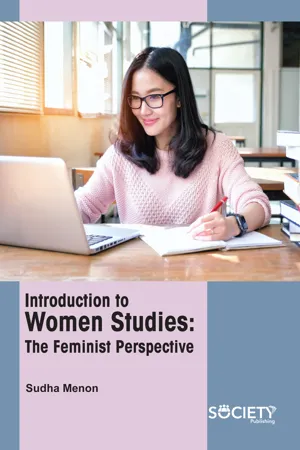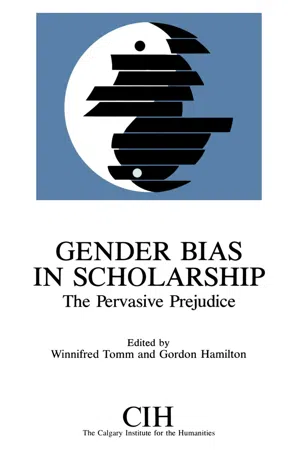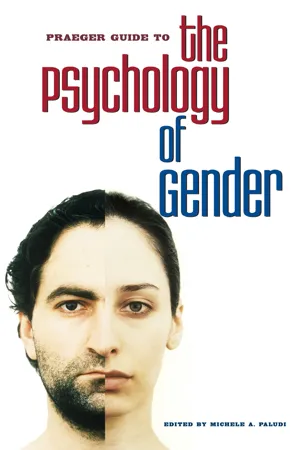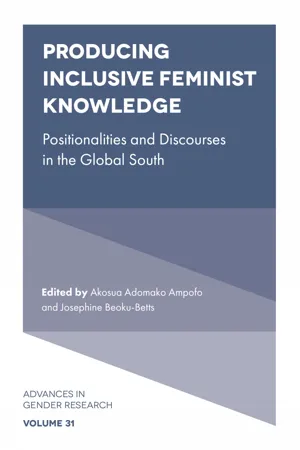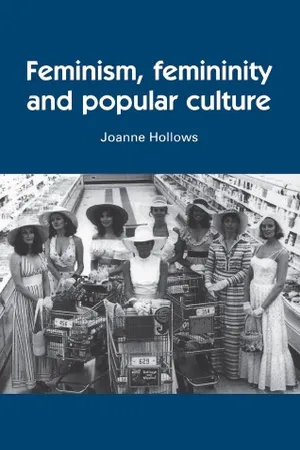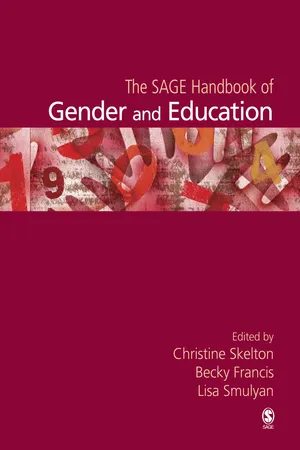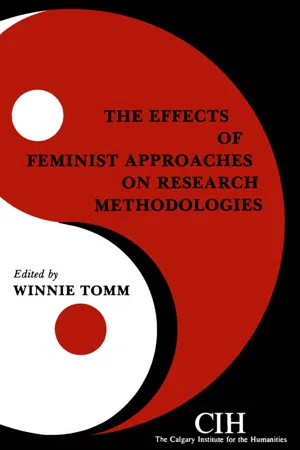Social Sciences
Feminism
Feminism is a social and political movement that advocates for the equality of the sexes and the rights of women. It seeks to challenge and dismantle gender-based discrimination, stereotypes, and power imbalances in society. Feminism encompasses a wide range of perspectives and approaches, all aimed at promoting gender equality and addressing issues such as reproductive rights, workplace discrimination, and gender-based violence.
Written by Perlego with AI-assistance
Related key terms
1 of 5
10 Key excerpts on "Feminism"
- Sudha Menon(Author)
- 2023(Publication Date)
- Society Publishing(Publisher)
Race and class issues, particularly welfare rights, were top of mind for socialist feminists. The main points of contention in this approach were the connections between sexism and racism, as well as patriarchy and capitalism. The economics, labor markets, households, and the state were all explored by these sociologists. Each of these viewpoints expanded our understanding of “sex” and “gender.” Most sociologists in the 1950s and 1960s thought in terms of “sex roles.” Gender was seen as an institution, a stratification axis, and even a performance by this new school of sociologists. Even biological distinctions began to be viewed as having a social construction component. 2.4. FEMINIST SOCIAL WORK THEORIES Feminist theory advocates for the inclusion of women’s concerns in social organization and seeks to comprehend and conceptualize gender roles. Feminist analysis examines people’s diverse experiences from a political viewpoint that includes sex-based analysis as one of the primary analytical lenses. Countless distresses endured by women, most of those experienced by men—can better be acknowledged within feminist theoretical analyzes in Introduction to Women Studies: The Feminist Perspective 46 aspects of sex-based and gender-based structural and social limitations, constrictions, and resource shortfalls, as these restrictions engage with numerous other structural and interpersonal restrictions. Feminist theories, for starters, analyzes and recommend ways to modify societal and environmental elements that cause or contribute to women’s issues and problems. Second, they explain and provide solutions to women’s intrapersonal and interpersonal issues. Third, feminist theories offer a lens through which to assess social and environmental experiences of individuals and groups, independent of sex or gender.- eBook - PDF
Gender Bias in Scholarship
The Pervasive Prejudice
- Winnie Tomm, Gordon Hamilton, Winnie Tomm, Gordon Hamilton(Authors)
- 2006(Publication Date)
- Wilfrid Laurier University Press(Publisher)
For instance, political science's recognition of the political nature of social movements means that it can study the Women's Movement; Jo Freeman won a prestigious thesis prize on this basis, admittedly in International Women's Year (Freeman 1975). A second stage of scholarship, which may be the first to be genuinely feminist, shifts attention to standards and techniques, finding a more serious sexism in the failure to apply to the study of women the criteria supposedly in general use. In political science at this point Susan Bourque and Jean Crossholtz (1974) showed how even eminent scholars have fudged footnotes, misusing earlier studies and disregarding evidence in their discussions of the supposed indifference of women to political participation. Thus, for instance, the few volunteered remarks of foreign-born Chicago women in a 1923 survey continue to be a major basis of statements that nonvoting women believe woman is a flower for men to look after and a women's place is in the home {Bourque and Crossholtz 1974: 256). Though feminist in perspective and intentions, most such early critiques of social-science scholarship in effect merely ask for adherence to the academy's professed standards. Virginia Sapiro phrases it as follows: Naomi Black / Feminist Perspective on Social Science 169 Accusations of sexism—whether levelled at the field as a whole or at an individual's work—are accusations of poor scholarship. Scholars cannot make assumptions about women or ignore gender where it is relevant without violating their own canons of research (1979: 264-65). This transforms accusations of sexism into relatively benign en-quiries that do not question methods or goals. Yet feminist political scientists in practice learn that neither gaps nor distortions in accepted wisdom can easily be remedied by use of the available approaches or data. They find themselves led to the use of relatively marginal sources such as oral history and parti-cipant observation. - eBook - PDF
- Margaret F. Bello(Author)
- 2019(Publication Date)
- Society Publishing(Publisher)
This chapter discusses the history of Feminism. While Feminism movement was gaining a foothold, an anti-feminist movement began, which opposed the principles of the feminist movement. This chapter discussed the Anti-Feminist movement as well. The chapter also elaborates the fact that Feminism is an effective tool for empowering women. Feminism often falls prey to some misinterpretation which results in a lot of deliberations and objection to the Feminism movement. This chapter discusses these misinterpretations that fuel the anti-feminist movement. This chapter also covers the main issues that modern Feminism has to overcome. Although the feminist movement has achieved much and fought for the equal right of women, it has its share of criticism, which has been discussed in this chapter. Finally, toxic Feminism has been explained as a rising threat to the society. This chapter ends on the note that there is a need for gendered men human security. 7.1. INTRODUCTION Feminism is a social movement that aims for economic, social, and political rights for women. The idea of Feminism is based on the notion that men and women are equal. Hence, they deserve equal rights in the society. The feminist movement in the past has achieved a lot and made immense contribution to the empowerment of women. It granted them voting rights, the right to works and a right to live a violence-free life. Although it appears that society has granted equal status to men and women, an introspection of the majority of challenges that women face can be linked to gender inequality that exists in the society. Statistics indicate that: • Women earn only 80 cents for every dollar a man earns for the same job. • Women form almost 50% of the population, but do not have the same representation in political leadership. • 1 in 3 women around the world has experienced violence in some form. These are just a few facts that prove that women empowerment still has a long road to travel. - eBook - PDF
- Michele A. Paludi(Author)
- 2004(Publication Date)
- Praeger(Publisher)
Each, at its core, refers to the belief that 272 Praeger Guide to the Psychology of Gender women and men should have equal social and political rights, responsibili- ties, and opportunities. Feminism acknowledges that women have been de- nied equality in many areas of life, and feminists seek to remove the oppression that has limited women's roles and choices. Feminism and femi- nists value women and believe that women should be empowered to define themselves and to be the subjects of their own experiences. Although there are some universal elements to Feminism, various femi- nist viewpoints with divergent ideas do exist. Each offers its own perspec- tive on the sources of women's oppression, the ramifications of oppression, and the solutions necessary to dismantle the system of oppression and in- equality. The prominent perspectives most relevant to psychology are dis- cussed below. Liberal feminists (sometimes referred to as moderate feminists) support changes in social and political institutions (e.g., laws, values, and customs) in order to attain equality between women and men (Crawford & Unger, 2004). In general, psychologists who hold this perspective tend to see differ- ences between women and men as the result of differential social condition- ing, reinforcements, and modeling. If they are given similar treatment (e.g., support for career advancement, praise for showing emotions), liberal femi- nists believe, women and men will behave similarly. Thus, women and men are more alike than different; when differences in behavior, cognition, and personality are found, they are the result of socialization rather than innate biological (e.g., genes, hormones) influences. In contrast to liberal feminists' emphasis on the similarities of women and men, cultural feminists focus on the differences. - eBook - PDF
Producing Inclusive Feminist Knowledge
Positionalities and Discourses in the Global South
- Akosua Adomako Ampofo, Josephine Beoku-Betts, Akosua Adomako Ampofo, Josephine Beoku-Betts(Authors)
- 2021(Publication Date)
- Emerald Publishing Limited(Publisher)
Feminist theories have reflected, in Brazil and throughout the world, the experiences, conflicts, and divergences within the women’s and femi-nist movements. The trajectories of feminist praxis and theories have crisscrossed trajectories that have gone (according to radical Feminism) from the conceptual centrality given to the category of sex (and later, gender) for the understanding of social inequalities, through the discussion of the relevance of the concept of class (according to socialist feminists), and through the recognition and consid-eration of the differences not only between gender (men, women, and other gender identities) but also of the differences among gender (within a gender category), particularly among women , based on factors such as gender identity, race, ethnic-ity, class, sexual orientation, disability, among other social cleavages correlated to structural and systemic inequalities. It may be argued that there is a growing consensus in the understanding of cur-rent Feminism as being an intersectional Feminism resulting from the recognition and understanding of gender interconnections with other factors that constrain social inequalities ( Bose, 2012 ; Collins & Bilge, 2016; Mohanty, 2004 ). Consistent with the new theorizations about the multiple and interconnected sources of iden-tity and inequality, it can be argued that Feminisms in both the global south and the global north have been transformed into a potentially emancipatory Feminism , for which overcoming gender inequalities implies abolition of other central forms of social inequality ( Bose, 2015 , Marchand & Runyan, 2011 ; Mohanty, 2004 ). Emancipatory Feminism goes beyond the affirmation of women’s rights and gen-der equality, and embraces the broader concept of social justice to propose equal-ity for the whole of society, not just for women. - eBook - PDF
- Heather MacIvor(Author)
- 2019(Publication Date)
- University of Toronto Press(Publisher)
The eagerness to disclaim any attachment to Feminism or the women's movement is widespread and, given the stereotype just de-scribed, understandable. 38 I WOMEN AND POLITICS IN CANADA: PART ONE In reality, Feminism is a set of diverse ideas with a few key points in common. First, feminists believe that women are not treated as well as men in our society. They point to violence against women, the wage gap, and the under-valuing of women's work in the home as proof for this claim. Second, feminists believe that women should be treated as well as men: their work should be valued fairly, whether at home or elsewhere, and their right to make choices concerning their own lives should be respected. In other words, a woman should have the same op-portunities and autonomy as a man. She should be safe in her own home and on the streets; she should not have to see demeaning images of her gender in popular culture; and she should be judged on the basis of her abilities and not according to stereotypes of women. Beyond these general principles, feminists differ on just about every-thing. Some feminists are pro-choice; others are strongly opposed to abortion. Some feminists believe that women should have access to pub-licly funded, high-quality child care so that they can pursue careers out-side the home, while others believe that women should stay home to care for their children. Some feminists are lesbians; most are heterosex-ual. Some well-known feminists are highly educated professionals and artists, but any woman can find useful ideas in Feminism. This chapter is an introduction to feminist thought, not a comprehensive discussion. Readers are urged to consult the list of works at the end of the chapter. The Currents Approach Most accounts of feminist theory divide it into three or four major cur-rents: liberal Feminism, radical Feminism, Marxist Feminism, and social-ist Feminism (these last two are sometimes coupled, sometimes treated separately). - eBook - PDF
- Joanne Hollows(Author)
- 2024(Publication Date)
- Manchester University Press(Publisher)
2 Feminism, cultural studies and popular culture This chapter explores the movement of Feminism into academic life in general and the study of popular culture in particular. Given that the women involved in feminist struggles in the US, and to a slightly lesser extent in the UK, were often highly educated, middle-class women, it is perhaps not surprising that feminist concerns made inroads into academic disciplines rela- tively quickly. However, this was not a straightforward process: Feminism's impact on different disciplines was uneven and femi- nist perspectives did not encounter existing bodies of knowledge without resistance. Feminists not only tried to challenge the gender-blindness and sexism of existing forms of knowledge, but also often tried to produce new forms of knowledge which would provide the basis for political action. Feminism also made an impact on academic life through the institutionalisation of Women's Studies courses and options. For example, as the Women Take Issue Editorial Group have argued, feminists working in Women's Studies often drew on their expe- riences of the women's movement and brought them into their academic practices by 'organising together both to share experi- ences,· and work together towards a knowledge of them, and to interrogate and appropriate "knowledge" and skills which exclude or ignore women' (1978, 8). Although there would be great variation between Women's Studies courses, they were often linked to a process of consciousness-raising while also situ- ating women's 'personal experience and their subjectively registered responses to them in a sociological and historical context' (p. 9). Women's Studies was also distinguished from other academic fields by the insistance on taking women as the starting point; by providing 'a critique of sexism and chauvinism in existing theories, texts and courses'; and by attempting to develop new conceptual tools to do feminist analysis (pp. 9-10). - eBook - PDF
Contemporary Political Concepts
A Critical Introduction
- Georgina Blakeley, Valerie Bryson(Authors)
- 2002(Publication Date)
- Pluto Press(Publisher)
This kind of analysis has directly inspired many feminist campaigns for equal social, political and economic rights, and is often described as ‘liberal Feminism’. More radical feminists have argued that gender is not simply about individual attributes and opportunities, but is also a basic principle of social organisation and the power of men over women, so that gender differences inevitably mean gender subordination for women. Here, the term patriarchy is often used as a shorthand for a social system based on male domination. The classic radical feminist theory of patriarchy was set out by Kate Millett in Sexual Politics in 1970. Millett argued that in all known societies, the relationship between the sexes has been based on men’s power over women: it is therefore political. Men’s power, she says, goes deeper than the power based on class or race, and it is so universal, so ubiquitous and so complete that it appears ‘natural’ and, until named by feminists, invisible. It is maintained by a process of socialisation which begins in the family and is reinforced by education, literature and religion; it also rests upon economic exploitation, state power and, ultimately, force (particularly sexual violence and rape). (Bryson 1999a:27) Marxist and socialist feminists have always looked beyond the indi-vidualistic assumptions of liberal Feminism, and many have recognised the existence and importance of patriarchy. However, many have also insisted that patriarchal oppression is less funda-mental than oppression based on class; during the 1970s and 1980s there was much feminist debate over ‘hierarchies of oppression’ and the relationship between patriarchy and capitalism (see Sargent 1986; and, for an overview, Bryson 1992). In recent years, black Feminism has helped reveal the narrow perspective of many white 110 Contemporary Political Concepts - eBook - PDF
- Christine Skelton, Becky Francis, Lisa Smulyan, Christine Skelton, Becky Francis, Lisa Smulyan(Authors)
- 2006(Publication Date)
- SAGE Publications Ltd(Publisher)
In recent decades, Feminism and gender theory have made major contributions both to the development of educational theory and to broader social theory. The focus of this chapter is to celebrate as well as to assess the achievements of what has been, and remains, an extraordinarily powerful and influential cumulative body of work. In recognition of this fact, the account sets the scope of ‘educa-tion Feminism(s)’ upon a broad canvas, by offering a critical consideration of some key moments, across time, in its complex and creative engagement with important cognate strands of modern social theory. This rich and mutually pro-ductive interface offers an important perspective both for understanding and for judging the wide-reaching impact of feminist research from the mid-twentieth century onward. Such work has been continuously important in establishing pro-ductive and challenging links between gender theory, education Feminism(s) 1 and social theory as it has developed within other traditions. Concentrating upon recent theoretical work in the ‘West’, principally within British and North American settings, the chapter particularly considers the significance of 4 ‘Education Feminism(s)’, Gender Theory and Social Thought: Illuminating Moments and Critical Impasses J o -A n n e D i l l a b o u g h the ubiquitous ‘cultural turn’ for recent theoretical debates about gender. The value of such a strategy is that it conveniently highlights the relation between emergent stances in critical educational theories and post-structural accounts, and those endur-ingly important materialist positions developed by feminist accounts of cultural reproduction in earlier years. In this way, the strength of feminist research is revealed in its simultaneous capacity both for intellectual flexibility and for deep theoretical coherence. We should therefore begin with a brief historical account of the achievements of feminist research in the field of education. - Winnie Tomm(Author)
- 2006(Publication Date)
- Wilfrid Laurier University Press(Publisher)
186 Effects of Feminist Approaches appropriate units of study, the important characteristics of the units, and the relationship between units (Graham 1983). Each technique's usefulness and its limitations are structured by its underlying assumptions. Adopting a research technique means adopting its conceptual framework. Feminist research raises profound questions concerning the conceptual framework of the social sciences (Eichler 1985 and Harding 1986: 9). It thereby questions the research techniques developed in conjunction with that framework. There are three major areas of focus in this discussion of research methodology: 1. power relationships between the researcher and the subjects of the research; 2. validity and importance of women's experiences; 3. assumptions built into established techniques of data collection and analysis. Power/Authority Issues The gender, class, race, and educational status of the researcher as well as her/his institutional affiliation, may all set up patterns of power and subordination which are part of the general society. 1 For the feminist who is challenging these patterns of power, this raises important ethical questions. By participating in these divisions the researcher is contributing to women's subordination. If being 'objective' means that the researcher must separate herself from the people she is studying, a number of further problems arise. The researcher's participation in the social patterns is denied or ignored. The complexity and contextual nature of reality and of the research process is not taken into account. Such denial and omission may also conceal ways in which the social relations of the research process shape the findings. These ethical and substantive questions are frequently raised by feminist researchers who are uncomfortable in the stance adopted by established researchers.
Index pages curate the most relevant extracts from our library of academic textbooks. They’ve been created using an in-house natural language model (NLM), each adding context and meaning to key research topics.
